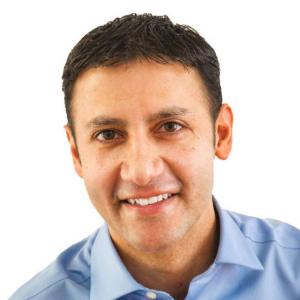Secondary menu
IHRP Alumni Profile: Arif Virani

Arif Virani, MP Parkdale-High Park and IHRP Alumni.
Sarah Firestone (2L) and Bethanie Pascutto (3L)
IHRP alumni Arif Virani came to Canada as a Ugandan-Asian refugee in 1972 when his family was forced to flee Idi Amin’s brutal dictatorship. After spending the rest of his childhood in Toronto, he attended McGill University, graduating in 1994 with a B.A. in History and Political Science. Arif graduated on the Dean’s List and Valedictorian from U of T law in 1998. After articling at Fasten Martineau DuMoulin LLP in Toronto, he spent a year training at the Middle Temple, Inns of Court in London, UK as a recipient of the Harold G. Fox Scholarship..
Arif was one of the founders of the South Asian Legal Clinic of Ontario, has worked as an Analyst with the Canadian Human Rights Commission in Ottawa, and an Investigator at la Commission des droits de la personne et droits de la jeunesse, in Montréal. He served as a Programme Officer with the Commonwealth Human Rights Initiative in New Delhi. and also spent a year as an Assistant Trial Attorney prosecuting genocide at the United Nation’s International Criminal Tribunal for Rwanda,. Arif received the Wilson-Prichard Award from the University of Toronto Faculty of Law in 2008 in recognition of his contribution to the legal profession and community.
1. As a student at the University of Toronto Faculty of Law, you were an IHRP summer fellow in Asia. How would you describe that experience?
Phenomenal. It was my first trip to India, and my first effort at working abroad. It was an eye opener—in part because of the conditions of work, in part because of the extremes I observed, of wealth, poverty, class, caste and sectarian tension
2. How did your involvement with the IHRP influence your career in law and now in politics?
It gave me a sense of how to appreciate human rights, and their vulnerability in many countries in the world. In particular, the crucial importance of the rule of law to ensuring respect for human rights. The rights you have on paper are worth little, unless the cultural norms are in place to ensure those rights are actually enforced and protected.
3. What motivates you to continue working for the public interest as a Member of Parliament?
The idea that as an elected Legislator, you are literally on the inside of the policy development world. I had spent a lot of time prior to getting elected, in working to advocate from without, for policy change. As an MP, I’m finally working within the system—that’s a heavy responsibility, but one I’m grateful to have. To my mind, when you’re given that responsibility, you have to always consider, first and foremost what kind of policy will serve the public interest
4. What does your position as Parliamentary Secretary for Multiculturalism entail? What are some of challenges associated with that position?
I assist the Minister of Heritage in implementing the central tenets of the Multiculturalism Act—effectively working to promote inclusion, build social cohesion, promote diversity, and empower the various communities that call Canada home. The biggest challenge in 2017 is combatting the wave of extremism and hatred that is surfacing globally, and here at home. Fighting prejudice and racism is not a thing of the past—the events of the past few years have taught us that this fight is more relevant than ever
5. Before entering politics you had a rewarding career as a constitutional litigator. Could you tell us a little more about your experiences?
I had a wonderful job practising law, litigating cases at all levels of court that dealt with interpreting Charter rights. I had the opportunity to argue cases involving freedom of expression, life, liberty and security of the person, judicial independence, and equality rights. It was always demanding, but very intellectually engaging.
6. Do you have any advice for students interested in following a similar path?
Do what you are interested in; don’t be afraid to take chances, and go out on a limb, even if it’s not financially rewarding, it can be rewarding in so many other ways. One of the smartest things I ever did was taking a chance on doing human rights work at an NGO in India on police reform—the pay was terrible, but the learning curve incredible. That lead me to a job with the UN as a war crimes prosecutor at the International Criminal Tribunal for Rwanda. The bottom line is that you have to be willing to take a chance, in order to access unique opportunities
In recognition of the IHRP’s 30th anniversary this year, Rights Review will be profiling notable alumni in each of its issues this year.
